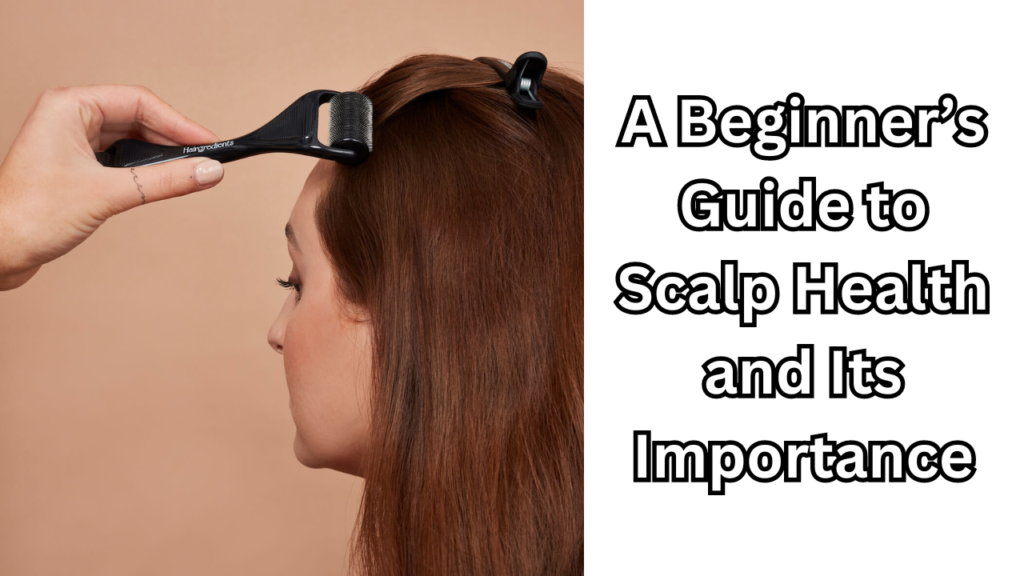

Table of Contents
Introduction
Scalp health is a fundamental yet often overlooked aspect of our overall hair care routine. While we invest time and resources in finding the best shampoos, conditioners, and styling products, we frequently neglect the foundation upon which healthy hair grows—the scalp. This guide aims to shed light on the importance of maintaining a healthy scalp and provide practical tips for ensuring its well-being.
Brief Introduction to Scalp Health
The scalp is a complex area of skin that houses hair follicles, sebaceous glands, and a rich supply of blood vessels. These elements work together to support hair growth and maintain its vitality. Just like the skin on our face, the scalp requires regular care to remain healthy. Issues such as dryness, excessive oiliness, dandruff, and inflammation can disrupt the scalp’s delicate balance, leading to a host of hair problems.
Importance of a Healthy Scalp for Overall Hair Health
A healthy scalp is the cornerstone of strong, lustrous hair. When the scalp is in optimal condition, hair follicles receive the nutrients and oxygen they need to produce robust hair strands. Conversely, an unhealthy scalp can impede hair growth, cause hair loss, and affect the overall texture and appearance of your hair. Conditions such as dandruff, psoriasis, and folliculitis can create an environment that is hostile to hair growth, emphasizing the need for proper scalp care.
By understanding the vital role the scalp plays in hair health and adopting a proactive approach to scalp care, you can enhance the health and appearance of your hair, ensuring it remains vibrant and strong.
Understanding Scalp Health
Scalp health is the cornerstone of strong, vibrant hair and is defined by the overall condition and functionality of the skin and associated structures on your head. A healthy scalp is balanced, neither too dry nor too oily, and free from flakiness, irritation, and inflammation. It provides an optimal environment for hair follicles to thrive, ensuring robust hair growth. Common scalp issues such as dandruff, dryness, oiliness, and sensitivity can disrupt this balance, leading to various hair problems. By understanding these issues and their underlying causes, you can adopt a proactive approach to scalp care, maintaining the foundation necessary for healthy hair.
Definition of Scalp Health
Scalp health refers to the condition and functioning of the skin and associated structures on your head. A healthy scalp is balanced, meaning it is neither too dry nor too oily and is free from flakiness, irritation, and inflammation. It provides a conducive environment for hair follicles to thrive, ensuring that hair grows strong and resilient. Proper scalp health encompasses the overall cleanliness, moisture balance, and absence of any pathological conditions.
Common Scalp Issues
- Dandruff:
- Symptoms: Flaking, itching, and sometimes redness.
- Causes: Overgrowth of yeast (Malassezia), dry skin, sensitivity to hair products, or conditions like seborrheic dermatitis.
- Management: Anti-dandruff shampoos containing zinc pyrithione, selenium sulfide, or ketoconazole can help control flaking and itching.
- Dryness:
- Symptoms: Flaky, itchy scalp, and tight feeling.
- Causes: Lack of moisture, excessive washing, harsh hair products, cold weather, and low humidity.
- Management: Use of moisturizing shampoos and conditioners, avoiding hot water, and incorporating hydrating treatments like oils or leave-in conditioners.
- Oiliness:
- Symptoms: Greasy scalp, which can lead to greasy hair, and sometimes an unpleasant odor.
- Causes: Overactive sebaceous glands, hormonal imbalances, improper washing routines, and use of heavy hair products.
- Management: Regular washing with a balancing shampoo, avoiding heavy conditioners on the scalp, and using oil-absorbing products like dry shampoo.
- Sensitivity:
- Symptoms: Redness, itching, burning sensation, and sometimes flaking.
- Causes: Allergic reactions to hair products, environmental factors, stress, and underlying skin conditions like eczema or psoriasis.
- Management: Identifying and avoiding triggers, using gentle, hypoallergenic hair products, and consulting a dermatologist for appropriate treatments.
Understanding these common scalp issues and their causes is the first step toward effective scalp care. By recognizing the signs and symptoms, you can take proactive measures to address and prevent these problems, ensuring a healthy environment for your hair to grow.
Anatomy of the Scalp
The scalp is a complex structure consisting of multiple layers, each playing a critical role in maintaining hair health. These layers include the skin (epidermis and dermis), the subcutaneous tissue, and the galea aponeurotica. The outermost layer, the epidermis, contains hair follicles, sebaceous (oil) glands, and sweat glands. Beneath it lies the dermis, which is rich in collagen and elastin fibers, providing strength and elasticity to the scalp. The subcutaneous tissue, composed of fat and connective tissue, cushions the scalp and connects it to the underlying structures, while the galea aponeurotica is a tough, fibrous layer that supports and anchors the scalp. This intricate anatomy not only protects the skull but also facilitates various functions essential for healthy hair growth.
Function of the Scalp in Hair Growth and Health
The scalp’s primary function in women hair growth and health is to support and nourish the hair follicles. Hair follicles, embedded in the dermis, are responsible for producing hair strands. They receive nutrients and oxygen from the blood vessels in the scalp, which are crucial for the growth and maintenance of healthy hair. The sebaceous glands secrete sebum, a natural oil that moisturizes the scalp and hair, preventing dryness and providing a protective barrier against environmental damage. Additionally, the scalp’s sweat glands help regulate temperature and excrete waste products. A healthy scalp ensures that hair follicles remain well-nourished and free from blockages or infections, facilitating the growth of strong, resilient hair. Proper scalp care, including regular cleansing, moisturizing, and avoiding harsh chemicals, is essential to maintain this delicate balance and promote optimal hair health.
Factors Affecting Scalp Health
Genetics
Genetics play a significant role in determining scalp health and predisposition to various scalp conditions. If your family has a history of issues such as dandruff, psoriasis, or alopecia, you may be more susceptible to experiencing similar problems. Genetic factors can influence the activity of sebaceous glands, hair follicle sensitivity, and the overall resilience of the scalp. Understanding your genetic predispositions can help in tailoring preventive measures and treatments to maintain a healthy scalp.
Hormonal Changes
Hormonal fluctuations can have a profound impact on scalp health. For instance, changes in hormone levels during puberty, pregnancy, or menopause can lead to an increase in oil production or alterations in the scalp’s natural balance, potentially causing conditions such as oily scalp or dandruff. Thyroid imbalances and other hormonal disorders can also affect hair growth and scalp condition. Managing hormonal health through proper medical guidance can help mitigate these effects and promote a healthier scalp.
Diet and Nutrition
What you eat directly affects the health of your scalp and hair. A balanced diet rich in essential vitamins and minerals—such as vitamins A, C, D, E, zinc, and omega-3 fatty acids—supports healthy hair growth and maintains scalp vitality. Deficiencies in key nutrients can lead to problems like dryness, hair loss, and poor scalp health. Ensuring adequate hydration and a well-rounded diet helps nourish the scalp from within, contributing to a healthier hair environment.
Environmental Factors
Environmental conditions, including pollution, harsh weather, and exposure to UV rays, can significantly impact scalp health. Pollution can lead to the accumulation of toxins and debris on the scalp, causing irritation and clogging hair follicles. Extreme weather conditions, such as excessive sun exposure or cold winds, can strip the scalp of its natural oils, leading to dryness and sensitivity. Protecting your scalp from environmental damage by using appropriate hair care products and protective measures is essential for maintaining a healthy scalp.
Signs of an Unhealthy Scalp
Itching and Irritation
Persistent itching and irritation are common indicators of an unhealthy scalp. These symptoms can be caused by various factors, including dryness, allergic reactions to hair products, or infections. If left untreated, itching and irritation can lead to further scalp damage and hair loss. Identifying the underlying cause and addressing it with appropriate treatments is crucial for relief and recovery.
Excessive Dryness or Oiliness
An imbalance in scalp moisture levels, whether excessive dryness or oiliness, can signal underlying issues. A dry scalp often feels tight and flaky, while an oily scalp may appear greasy and attract dirt. Both conditions can lead to discomfort and exacerbate other scalp problems. Using products designed to restore balance and maintaining a proper cleansing routine can help manage these issues effectively.
Flaking and Dandruff
Flaking and dandruff are visible signs of scalp problems, often resulting from an overgrowth of yeast, dry skin, or sensitivity to hair products. Dandruff typically presents as white or yellow flakes on the scalp and shoulders and can be accompanied by itching. Addressing dandruff with specialized shampoos and treatments can help alleviate symptoms and improve scalp health.
Hair Thinning or Loss
Hair thinning or loss can be a distressing sign of an unhealthy scalp and may indicate underlying conditions such as hormonal imbalances, nutrient deficiencies, or scalp disorders. If hair loss is accompanied by other symptoms like redness, inflammation, or noticeable changes in scalp condition, it is essential to seek professional advice for proper diagnosis and treatment. Early intervention can help address the root causes and promote hair regrowth.
Daily Scalp Care Routine
Importance of Regular Cleansing
Regular cleansing is crucial for maintaining a healthy scalp as it helps remove dirt, oil, sweat, and product buildup. Accumulated residues can clog hair follicles, leading to issues like dandruff and scalp irritation. Cleansing the scalp daily or as needed depending on your hair type ensures that the scalp remains fresh and free from impurities, promoting a balanced environment conducive to hair growth. It is important to use a gentle shampoo that does not strip away natural oils excessively, which can cause dryness or irritation.
Choosing the Right Shampoo and Conditioner
Selecting the appropriate shampoo and conditioner for your scalp type is essential for effective care. For oily scalps, opt for clarifying shampoos that can manage excess sebum without over-drying. For dry scalps, choose hydrating shampoos and conditioners that provide moisture and soothe the skin. Those with sensitive scalps should look for hypoallergenic or fragrance-free products to avoid irritation. Using products specifically formulated for your scalp type helps maintain its balance and supports overall hair health.
Techniques for Proper Scalp Massage
Scalp massage enhances circulation and can promote healthy hair growth. To perform an effective scalp massage, use your fingertips (not nails) to gently apply pressure in small, circular motions. This technique helps stimulate blood flow to the hair follicles, improving nutrient delivery and relaxation. Incorporating a few drops of nourishing oils, such as coconut or jojoba oil, can further enhance the massage by providing additional moisture and nutrients. Aim for a scalp massage a few times a week to reap the benefits of improved scalp health.
Weekly and Monthly Scalp Treatments
Exfoliation for the Scalp
Exfoliating the scalp is a key step in maintaining its health by removing dead skin cells and product buildup that can clog hair follicles. Use a gentle scalp scrub or exfoliating brush once a week to slough off these residues. This process not only helps prevent dandruff and promotes better absorption of hair care products but also enhances overall scalp hygiene. Avoid over-exfoliating, as it can lead to irritation or sensitivity.
Deep Conditioning Treatments
Deep conditioning treatments provide intensive moisture and nourishment to the scalp and hair. These treatments typically involve applying a rich conditioner or treatment mask to the scalp and hair, leaving it on for an extended period to allow for deep penetration. Performing a deep conditioning treatment once a week or as needed helps address dryness, damage, and frizz, leaving the scalp and hair feeling soft and revitalized. Look for products with ingredients like shea butter, argan oil, or keratin for added benefits.
Scalp Masks and Their Benefits
Scalp masks offer targeted treatments for various scalp issues, such as dryness, oiliness, or irritation. They are designed to address specific concerns and provide a concentrated dose of active ingredients. For example, hydrating masks can replenish moisture, while detoxifying masks can cleanse and purify the scalp. Applying a scalp mask once a week or biweekly can enhance the overall health of the scalp by addressing individual needs and promoting a balanced environment for hair growth.
Dietary Tips for Scalp Health
Nutrients Essential for Scalp Health
A balanced diet rich in essential nutrients supports optimal scalp health. Key nutrients include vitamins A, C, D, and E, which play roles in maintaining skin health and promoting hair growth. Minerals like zinc and iron are crucial for healthy hair follicles, while omega-3 fatty acids help reduce inflammation and support scalp moisture. Ensuring adequate intake of these nutrients through diet or supplements can help maintain a healthy scalp and encourage strong hair growth.
Foods to Include in Your Diet
Incorporating nutrient-dense foods into your diet can enhance scalp health. Foods such as fatty fish (like salmon and mackerel), nuts and seeds, leafy greens, and fruits rich in vitamins and antioxidants are particularly beneficial. Additionally, protein-rich foods like eggs and lean meats support hair strength and repair. A diverse diet that includes a variety of these nutrient-rich foods helps provide the essential building blocks needed for a healthy scalp and hair.
Hydration and Its Impact on Scalp Health
Hydration plays a crucial role in maintaining scalp health. Drinking sufficient water daily ensures that your body and scalp remain hydrated, which helps prevent dryness and flakiness. Proper hydration supports the scalp’s natural oil production, contributing to a balanced and well-moisturized environment. Aim to drink at least eight glasses of water a day, and consider incorporating hydrating foods like cucumbers and melons into your diet to further support scalp hydration.
Common Scalp Care Mistakes to Avoid
Over-Washing or Under-Washing
One of the most common mistakes in scalp care is either over-washing or under-washing the scalp. Over-washing can strip the scalp of its natural oils, leading to dryness and irritation, while under-washing can result in the buildup of oil, dirt, and product residues, which can clog hair follicles and cause issues like dandruff and acne. It’s essential to find a balance based on your scalp type and lifestyle. Typically, washing your scalp 2-3 times a week is sufficient for most people, but adjustments may be needed based on individual needs and hair type.
Using Harsh Products
Using harsh shampoos, conditioners, or styling products can damage the scalp’s delicate balance. Products containing sulfates, parabens, and alcohols can strip natural oils, leading to dryness and irritation. Additionally, excessive use of heat-styling tools and chemical treatments can exacerbate scalp issues. Opt for gentle, sulfate-free products and avoid excessive use of heat and chemicals to maintain a healthy scalp.
Ignoring Scalp Issues
Neglecting to address scalp issues can lead to more severe problems over time. Issues such as itching, flaking, or excessive oiliness should not be ignored, as they can indicate underlying conditions that may worsen if left untreated. Regularly monitoring your scalp’s condition and addressing any concerns with appropriate treatments or lifestyle changes is crucial for maintaining overall scalp health.
Natural Remedies for Scalp Health
Essential Oils
Essential oils like tea tree oil and peppermint oil are popular natural remedies for improving scalp health. Tea tree oil has antimicrobial properties that can help combat dandruff and fungal infections, while peppermint oil can stimulate blood flow and provide a refreshing sensation. To use essential oils safely, dilute them with a carrier oil, such as coconut or jojoba oil, before applying them to the scalp. This helps prevent irritation and ensures effective results.
Home Remedies
Home remedies such as aloe vera and apple cider vinegar offer various benefits for scalp health. Aloe vera has soothing and moisturizing properties, making it ideal for dry or irritated scalps. Apply fresh aloe vera gel directly to the scalp, leave it on for 15-20 minutes, and then rinse. Apple cider vinegar can help balance the scalp’s pH and reduce dandruff. Mix equal parts apple cider vinegar and water, apply it to the scalp, leave it for a few minutes, and then rinse thoroughly. Always perform a patch test before using these remedies to ensure you don’t have any adverse reactions.
Benefits and Precautions
Natural remedies can provide effective solutions for common scalp issues and support overall scalp health. However, it’s important to use them correctly and in moderation. Overuse or improper application can lead to irritation or allergic reactions. Additionally, if you have sensitive skin or underlying conditions, consult with a healthcare professional before using natural remedies to ensure they are suitable for your scalp.
When to Seek Professional Help
Identifying Severe Scalp Conditions
Certain scalp conditions, such as severe dandruff, persistent itching, redness, or noticeable hair loss, may require professional attention. If over-the-counter treatments and home remedies do not alleviate symptoms, or if you experience significant discomfort or hair thinning, it’s important to seek help from a specialist. Severe conditions may indicate underlying issues that need medical intervention or specialized treatments.
Choosing a Dermatologist or Trichologist
For persistent or complex scalp problems, consider consulting a dermatologist or a trichologist. Dermatologists specialize in skin conditions and can provide comprehensive treatments for scalp issues and related skin disorders. Trichologists focus specifically on hair and scalp health, offering expertise in diagnosing and treating hair loss and other scalp-related conditions. Choose a professional based on your specific needs and ensure they have experience with your particular scalp issue for effective treatment.
Scalp Health and Hair Growth
Connection Between Scalp Health and Hair Growth
Scalp health is directly linked to hair growth, as a healthy scalp provides the ideal environment for hair follicles to thrive. Proper blood circulation, balanced oil production, and a clean, nourished scalp contribute to optimal hair growth. Conversely, issues such as clogged follicles, inflammation, or nutrient deficiencies can hinder hair growth and lead to hair thinning or loss. Maintaining a healthy scalp is therefore essential for promoting and sustaining healthy hair growth.
Tips to Promote Healthy Hair Growth Through Scalp Care
To enhance hair growth through scalp care, focus on practices that improve scalp health. Regular cleansing and moisturizing help maintain the scalp’s balance and prevent issues that can impede hair growth. Incorporate scalp massages to boost circulation and ensure that hair follicles receive adequate nutrients. Use products rich in vitamins and minerals to nourish the scalp and address deficiencies. Additionally, adopting a balanced diet and staying hydrated supports overall scalp health, creating the optimal conditions for hair growth.
Seasonal Scalp Care
Adjusting Your Scalp Care Routine for Different Seasons
Seasonal changes can affect your scalp’s needs, requiring adjustments to your care routine. In colder months, the scalp may become drier and more prone to flakiness due to low humidity and indoor heating. Use richer moisturizers and consider incorporating hydrating treatments to combat dryness. In warmer months, increased sweating and sun exposure can lead to oiliness and scalp irritation. Opt for lighter, clarifying shampoos and sun protection for your scalp. Tailoring your routine to seasonal conditions helps maintain optimal scalp health year-round.
Dealing with Weather-Related Scalp Issues
Weather conditions can exacerbate scalp issues. Cold weather and low humidity can strip moisture from the scalp, leading to dryness and irritation. Protect your scalp with hats or scarves and use hydrating products to counteract the effects of harsh weather. In hot, sunny weather, UV rays and heat can cause scalp damage and increased oil production. Use products with UV protection and regularly cleanse to manage excess oil and prevent buildup. By addressing weather-related concerns proactively, you can keep your scalp healthy and comfortable throughout the year.
Products for Scalp Health
Recommended Shampoos, Conditioners, and Treatments
Selecting the right products for scalp health is essential for maintaining balance and addressing specific issues. For those with oily scalps, a clarifying shampoo can help manage excess sebum and prevent buildup. For dry scalps, hydrating shampoos and conditioners that contain moisturizing agents like shea butter or glycerin are beneficial. Treatments such as scalp serums or leave-in conditioners can provide additional moisture and nourishment. For addressing dandruff or other scalp conditions, medicated shampoos containing active ingredients like ketoconazole or selenium sulfide are recommended. Regular use of these products, tailored to your scalp’s needs, helps maintain a healthy and balanced environment in this fashion.
Ingredients to Look For
When choosing products for scalp health, pay attention to key ingredients that address specific concerns. Salicylic acid is effective for exfoliating the scalp and removing excess dead skin cells, which can help with dandruff and flakiness. Biotin is a B-vitamin that supports hair strength and growth by nourishing the scalp and hair follicles. Tea tree oil offers antimicrobial properties that can help combat scalp infections and dandruff. Aloe vera and hyaluronic acid provide soothing and hydrating benefits, ideal for dry or irritated scalps. Selecting products with these beneficial ingredients can enhance scalp health and address various issues.
How to Choose the Right Products for Your Scalp Type
Choosing the right products begins with understanding your scalp type and its specific needs. If you have an oily scalp, look for products labeled as “clarifying” or “balancing” to manage excess oil without over-drying. For a dry scalp, opt for “moisturizing” or “hydrating” products that contain emollients and humectants to restore moisture. Those with sensitive scalps should choose “hypoallergenic” or “gentle” formulations to avoid irritation. Conduct a patch test with new products to ensure they do not cause adverse reactions. By selecting products based on your scalp type, you can address issues effectively and maintain a healthy scalp.
Conclusion
Recap of the Importance of Scalp Health
Scalp health is a critical component of overall hair care, as a healthy scalp provides the foundation for strong, vibrant hair. Proper scalp maintenance helps prevent issues such as dryness, oiliness, dandruff, and hair thinning, ensuring that hair follicles remain nourished and functional. Addressing scalp health proactively through effective cleansing, moisturizing, and treatment routines can significantly enhance the beauty and appearance of your hair.
Encouragement to Adopt a Consistent Scalp Care Routine
Adopting a consistent scalp care routine is essential for achieving and maintaining optimal scalp health. Regularly cleansing, moisturizing, and treating your scalp with appropriate products tailored to your specific needs will help keep it balanced and healthy. Incorporate daily, weekly, and monthly care practices to address different aspects of scalp health and adapt your routine as needed based on seasonal changes or emerging concerns.
Final Tips for Maintaining a Healthy Scalp
To maintain a healthy scalp, prioritize a balanced diet rich in essential nutrients and stay hydrated to support overall scalp health. Be mindful of environmental factors and protect your scalp from harsh weather and pollutants. Avoid common mistakes such as over-washing or using harsh products, and pay attention to any signs of scalp issues that may require professional attention. By following these tips and maintaining a dedicated scalp care regimen, you can enjoy a healthier scalp and more resilient, beautiful hair.





